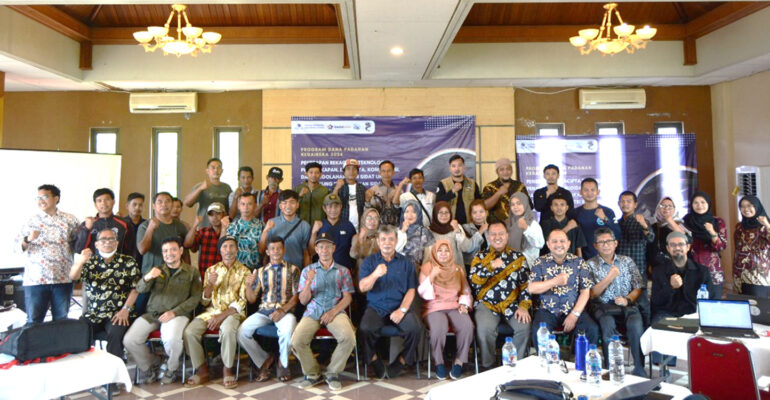Supporting the Sidat Fish Industry, IPB University FPIK Lecturers Give Training on Cultivation, Conservation to Processing

A number of IPB University lecturers from the Kedaireka team of the Faculty of Fisheries and Marine Science (FPIK), led by Dr Agus Oman Sudrajat, held a training and socialization of design with the theme ‘Application of Recreation of Catching Technology, Cultivation, Conservation and Processing of Sidat Fish to Support the Sustainable Sidat Fish Industry’. The activity took place at Karang Sari Hotel, Palabuhan Ratu, some time ago.
Dr Ronny Irawan Wahju provided material on eel capture and eel transportation systems. He explained that the captured eel or glass eel needs to be handled so that it is not stressed when it is cultivated.
“Errors or negligence in handling post-capture seeds or seeds that have just been purchased from collectors will have a high risk, namely death that occurs at the beginning of rearing (delay mortality),” he said.
Meanwhile, Dr Mukhlis Kamal emphasized the importance of eel conservation. According to him, eels need to be conserved to prevent extinction. This is because eels have a complicated life cycle, while the level of utilization is high. Another factor is that eel fish is currently still fully dependent on catches in nature, as well as slow fish growth.
One of the IPB University professors involved, Prof Mala Nurilmala, provided material on diversification and processing of eel fish. She explained the nutritional content of eel fish including vitamins A, B1, B2, B6, C, D, protein, and omega-3.
“The meat can be processed into kabayaki seasoned stews, kabayaki seasoned salad and dimsum. The remaining bones and head of eel fish are also used to be processed into fish broth, thus fulfilling the principle of zero waste processing,” she said.
Regarding eel cultivation, Dr Agus Oman Sudrajat also explained that good eel cultivation starts with raising glass eel until it becomes elver. Cultivators must pay attention to the nursery container, maintenance media, seed conditions, feed, and maintenance management.
Furthermore, Dr Tatag Budiardi delivered material related to eel breeding and enlargement. “Glass eel must adapt from the marine environment to the inland water environment with different salinity. Such conditions require farmers to handle glass eel with great care, so that glass eel can live normally,” he explained.
On that occasion, Johan, a representative from the Sukabumi Regency Maritime and Fisheries Service revealed, “With this training, it is hoped that the community will become more aware of how to catch and process eels, so that eels are expected to become a commodity that can be featured in Sukabumi.”
The training on eel processing was conducted at the Marine Field Station (SLK) of FPIK IPB University. Eneng, one of the participants in this training stated that this training was very useful. She also said that the community can get raw materials more easily so that they can use the knowledge gained to start processing eel fish into products that have selling value. (*/Rz) (IAAS/RUM)



